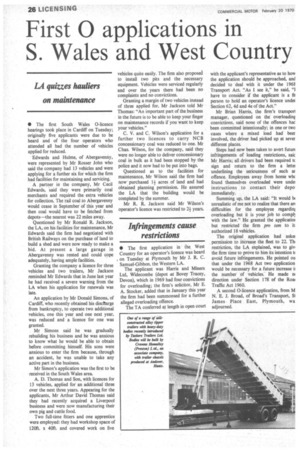First 0 applications in S. Wales and West Country
Page 28

If you've noticed an error in this article please click here to report it so we can fix it.
L4 quizzes hauliers on maintenance • The first South Wales 0-licence hearings took place in Cardiff on Tuesday; originally five applicants were due to be heard and of the four operators who attended all had the number of vehicles applied for reduced.
• Edwards and Hulme, of Abergavenny, were represented by Mr Rosser John who said the company had 13 vehicles and were applying for a further six for which the firm had facilities for maintaining and servicing.
A partner in the company, Mr Cecil Edwards, said they were primarily coal merchants and required the extra vehicles for collection. The rail coal to Abergavenny would cease in September of this year and then coal would have to be fetched from depots—the nearest was 22 miles away.
Questioned by Mr Ronald R. Jackson, the LA, on his facilities for maintenance, Mr Edwards said the firm had negotiated with British Railways on the purchase of land to build a shed and were now ready to make a bid. At present a large garage in Abergavenny was rented and could cope adequately, having ample facilities.
Granting the company a licence for three vehicles and two trailers, Mr Jackson reminded Mr Edwards that in June last year he had received a severe warning from the LA when his application for renewals was late.
An application by Mr Donald Simons, of Cardiff, who recently obtained his discliarge from bankruptcy, to operate two additional vehicles, one this year and one next year, was reduced and a licence for one was granted.
Mr Simons said he was. gradually rebuilding his business and he was anxious to know what he would be able to obtain before committing himself. His sons were anxious to enter the firm because, through an accident, he was unable to take any active part in the business.
Mr Simon's application was the first to be received in the South Wales area.
A. D. Thomas and Son, with licences for 13 vehicles, applied for an additional three over the next three years. Appearing for the applicants, Mr Arthur David Thomas said they had recently acquired a Liverpool business and were now manufacturing their own pig and cattle food.
Two full-time fitters and one apprentice were employed: they had workshop space of 120ft. x 40ft. and covered work on five vehicles quite easily. The firm also proposed to install two pits and the necessary equipment. Vehicles were serviced regularly and over the years there had been no complaints and no convictions.
Granting a margin of two vehicles instead of three applied for, Mr Jackson told Mr Thomas: "An important part of the business in the future is to be able to keep your finger on maintenance records if you want to keep your vehicles."
C. V. and C. Wilson's application for a further two licences to carry NCB concessionary coal was reduced to one. Mr Chas. Wilson, for the company, said they were no longer able to deliver concessionary coal in bulk as it had been stopped by the police and it now had to be put into bags.
Questioned as to the facilities for maintenance, Mr Wilson said the firm had now purchased 1+ acres of land and had obtained planning permission. He assured the LA that the building would be completed by the summer.
Mr R. R. Jackson said Mr Wilson's operator's licence was restricted to 21 years.
Infringements cause restrictions
• The first application in the West Country for an operator's licence was heard on Tuesday at Plymouth by Mr J. R. C. Samuel-Gibbon, the Western LA.
The applicant was Han-is and Miners Ltd, Widecombe (depot at Hovey Tracey, Devon), which in 1969 had four convictions for overloading; the firm's solicitor, Mr E. A. Stocker, added that in January this year the firm had been summonsed for a further alleged overloading offence. The TA conferred at length in open court with the applicant's representative as to how the application should be approached, and decided to deal with it under the 1962 Transport Act. "As I see it," he said, "1 have to consider if the applicant is a flu person to hold an operator's licence undel Section 62, 4d and 4e of the Act."
Mr Brian Harris, the firm's transpon manager, questioned on the overloading convictions, said none of the offences hac been committed intentionally; in one or two cases where a mixed load had beer involved, the driver had picked up at sever different places.
Steps had now been taken to avert futun infringements of loading restrictions, saic Mr Harris; all drivers had been required tc sign and return to the firm a lette underlining the seriousness of such ax offence. Employees away from home whr found themselves overloaded were uncle instructions to contact their depo immediately.
Summing up, the LA said: "It would b unrealistic of me not to realize that there an difficulties for the employee regardini overloading but it is your job to comph with the law." He granted the applicatioi but restricted the firm pro tern to 'it authorized 18 vehicles.
The original application had asker permission to increase the fleet to 22. Thi restriction, the LA explained, was to giv the firm time to prove to him its intention h avoid future infringements. He pointed ou that under the 1968 Act two application would be necessary for a future increase ii the number of vehicles: He made m direction under Section 178' 'of the Ron Traffic Act 1960.
A second 0-licence application, from M N. E. J. Broad, of Broad's Transport, SI James Place East, Plymouth, wa adjourned.














































































































































































































